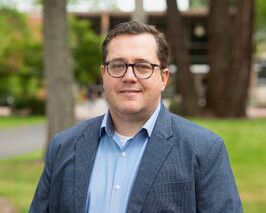Page 12 • (12,582 results in 0.036 seconds)
-
Wild Hope Center for Vocation faculty and staff.
Joanna Gregson Provost and Senior Vice President for Academic Affairs Full Profile 253-535-7126 gregson@plu.edu
-
Library faculty and staff.
Roberto Arteaga Associate Professor & Instruction and Reference Librarian Full Profile 253-535-7505 rarteaga@plu.edu
-
1. Upon completion of the social work program, students will demonstrate professional and ethical behavior, including ethical decision-making, using reflection & self-regulation, demonstrating
Social Work Learning Outcomes1. Upon completion of the social work program, students will demonstrate professional and ethical behavior, including ethical decision-making, using reflection & self-regulation, demonstrating professional demeanor.2. By the end of the social work program, students will be able to identify social policy at the local, state, and federal level that impacts well-being, service delivery, and access to social services; assess how social welfare and economic policies
-

What is your educational background? I received my Bachelors of Music Education (1977) and Master of Arts in Choral Conducting (1982) from West Texas State University (now West Texas A&M ) in Canyon, Texas. I received the Doctor of Musical Arts in Choral Conducting from…
, students have to learn to read music well, know something about the theory behind musical structure, and work at developing their instrument, no matter what that is. I think it’s even better if they can perform on more than one instrument—voice/piano, voice/violin, voice/trumpet—it helps deepen your musical understanding. Students who display pride and dedication to their work and great organizational skill do very well. And finally, be a team player! In your time at PLU, what have you learned from
-
The PLU School of Business is a community of compassionate faculty, staff, and administrators who provide an excellent business education in a student-centered learning environment grounded in the
management, and the global business environment. Prerequisite: BUSA 201. (4) BUSA 305 : Behavior in Organizations Working with and leading others in the global environment at individual, group, and organizational levels. Learning skills to organize and manage people with emphasis on individual and team dynamics, personality and values, diversity, motivation, leadership, decision-making, conflict, organizational culture, and change. Prerequisite: BUSA 201. (4) BUSA 308 : Principles of Marketing Introduces
-
The PLU Psychology colloquium series aims to provide PLU students, faculty and staff rich, meaningful exposure to the state of the art in research in psychology.
, Ph.D. Professor & Director of Graduate Studies Linguistics, University of Oregon November 22, 2024, 2-3pm, Xavier 201 Learning theory aims to discover the mechanisms by which beliefs and behavior, across domains, are changed by experience. Research on language acquisition has been somewhat disconnected from learning theory since the mid-1950s when Noam Chomsky wrote a scathing review of B. F. Skinner’s book Verbal Behavior, which aimed to apply learning theory to language. However, since the mid
-
The Intercultural Development Inventory is a 50-item questionnaire available online that can be completed in 15–20 minutes with complete confidentiality.
Intercultural Development Inventory® Is this program right for your organization? The Intercultural Development Inventory assesses intercultural competence—the capability to shift cultural perspective and appropriately adapt behavior to cultural differences and commonalities. Email the program manager to find out more The Intercultural Development Inventory is a 50-item questionnaire available online that can be completed in 15–20 minutes with complete confidentiality. PLU’s Qualified
-

Assistant Professor of Education | School of Education | jwright@plu.edu | John Wright teaches special education methods courses, as well as courses in assistive technology, autism, and behavior management.
Childhood Special Education Applied Behavior Analysis Selected Articles Wright, J., Barker, A., Himes, D., & Schaeffer, B. "Inclusive practices to teach preschoolers coding and robotics." Manuscript in preparation. 2023: Wright, J., Knight, V., & Barton, E. "A review of video-based modeling to teach STEM to students with autism spectrum disorder and intellectual disability." Research in Autism Spectrum Disorders. 2020: doi:10.1016/j.rasd.2019.101476 . Wright, J., Knight, V., Barton, E., & Edwards-Bowyer
Contact Information -

By Sarah Cornell-Maier ‘19. This Fall, Pacific Lutheran University is introducing a new history class that serves as a gateway to the Innovation Studies Program . Hist/Phil 248: Innovation, Ethics, and Society is a team-taught course that combines many different fields of study into one.…
, describes innovation and ethical behavior in the food industry, one of the themes of the Hist/Phil 248 course. Pathways into the Program The Innovation Studies minor offers a unique set of features for students, including an opening and concluding course that focuses on teaming and innovation. Hist/Phil 248 provides the introduction to the program, which introduces group work, leadership, and building a shared vocabulary that includes history and ethics. Inov 350 is the final course, which puts
-

Following PLU’s annual University Conference kick-off, our faculty members attended a number of breakout sessions, one of which was led by Teresa Ciabattari, chair of Women’s and Gender Studies and associate professor of Sociology. Here, Dr. Ciabattari helps us understand what we can do to…
PLU’s students of color feel a greater sense of belonging. Because one of our main goals is for Pacific Lutheran University to become known for inclusive excellence—a welcoming community that engages all of its diversity in the service of student and organizational learning—I would like to delve into each a little more deeply. What is belonging, and why is it important? Belonging refers to students’ sense of being accepted, valued and supported in an educational setting. It is about being valued as
Do you have any feedback for us? If so, feel free to use our Feedback Form.


